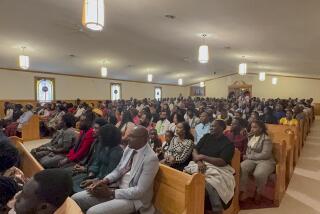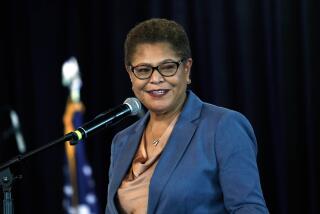Maine Mayor Vows to Reduce Tension With Somalis
- Share via
BOSTON — The mayor of Lewiston, Maine, on Friday backed away from his earlier statement that a recent, dramatic influx of more than 1,000 Somali refugees was creating an overwhelming financial burden in his city of 36,000.
Following a meeting with elders from the Somali community, Mayor Larry Raymond vowed to work to reduce tensions with the hundreds of mostly Muslim families who have migrated to Maine’s second-largest city.
Raymond was not available for comment. But in a written statement released after Friday’s meeting at City Hall, the Somali elders said: “Like all families, we have our misunderstandings, but families draw strength from resolving their issues.”
The dispute surfaced earlier this week after Raymond wrote a three-page letter to Somali leaders in Lewiston charging that the city was “maxed-out financially, physically and emotionally” by the influx of immigrants from the east African nation.
Raymond said his city would be unable to absorb more newcomers from Somalia “without negative results for all.”
A contingent of 25 Somalis responded in a letter that Raymond’s message was “inflammatory and disturbing”--and that the mayor himself was “an ill-informed leader who is bent toward bigotry.”
In February 2001, Somali families began arriving in a city filled largely with descendants of French and Irish immigrants who came to work in Lewiston’s mills and shoe factories more than a century ago. Lewiston is 98% white; and according to the 2000 U.S. census, Maine has the highest percentage of white residents of any state.
Many of the Somalis were “second-wave” immigrants, meaning they first settled elsewhere in the U.S. after fleeing to camps in Kenya from a homeland ravaged by civil war. Many first attempted to put down roots near Atlanta. But they found the area to be crime-ridden and inhospitable.
Through service agencies such as Catholic Charities USA, large groups of Somali families next found their way to Portland, Maine. But with a rental housing vacancy rate less than 1%, the state’s largest city was unable to absorb the quick surge in its population.
Phil Nadeau, assistant city administrator of Lewiston, said in an interview Friday that the sudden arrival of more than 1,000 immigrants from Somalia posed challenges and opportunities for a starkly homogenous community.
“This city had no infrastructure in place to respond to this,” Nadeau said.
Many of the immigrants appeared in Lewiston after their refugee resettlement assistance from the federal government had run out.
“It is pretty clear that this particular group has needs,” Nadeau said, citing issues such as language, education, housing, health care and job training.
“These needs have not been met exclusively through those programs which the federal government has in place to resettle refugees initially in this country.”
Fifteen city and regional agencies have provided aid to the Somali refugees, Nadeau said. General assistance spending in Lewiston has more than doubled since the immigrants began arriving, with most of it going to the Somali community, an aide to Nadeau said.
About half of the 412 Somali adults living in Lewiston have found work, city officials said. An old grocery store on Lewiston’s main street was converted to a mosque. Somali-owned businesses have blossomed in a downtown that lies close to Bates College.
Mohamed Diriye, who moved to Lewiston from Atlanta, said earlier in the week, “To be calm and without trouble, that is why we chose here. In big cities, life is hard.”
In a statement Friday, Raymond acknowledged that he erred in sending his letter to Somali leaders without first meeting with them. But he also said the intent of his missive was misunderstood.
“Those who have interpreted my letter as a ‘call to battle’ or have used it as a ‘call to draw lines in the sand’ totally misunderstood my message,” Raymond said.
The mayor’s letter generated healthy debate on the streets of Lewiston, as well as on the editorial page of the city’s daily newspaper. Raymond’s predecessor, former Mayor Kaileigh Tara, announced that she “wanted to cry” after reading what Raymond wrote.
After meeting with Raymond on Friday, the Somali leaders said they appreciated “the social and economic pressure that new entrants bring to the community.”
Their statement also said, “We believe that we are part of Lewiston’s future. We believe this is a city where we and our children can prosper. To that end, we, the city and the mayor are at one working for the future of Lewiston.”
More to Read
Sign up for Essential California
The most important California stories and recommendations in your inbox every morning.
You may occasionally receive promotional content from the Los Angeles Times.










